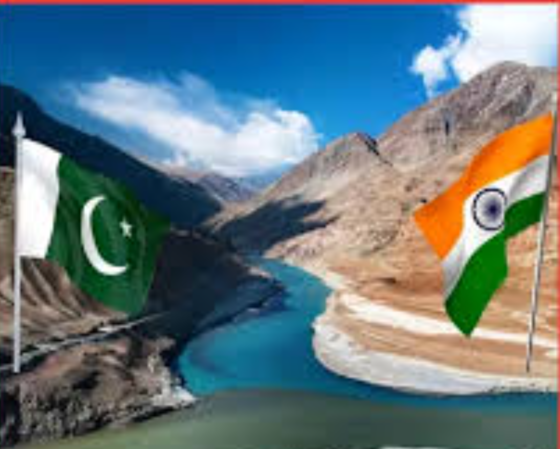By Ahsan Ansari
In a move that has shaken the foundations of South Asian diplomacy, the Indian government has officially suspended its obligations under the Indus Waters Treaty (IWT), also known in Pakistan as the Sindh Tas Agreement. The decision has sparked serious legal, political, and humanitarian concerns, with Pakistan and the international community labeling it a clear-cut violation of international law and bilateral agreements.
Signed in 1960 by Indian Prime Minister Jawaharlal Nehru and Pakistani President Ayub Khan with the facilitation of the World Bank, the Indus Waters Treaty has long been seen as a model of water-sharing cooperation. It divided the six rivers of the Indus basin between the two countries: India received control of the eastern rivers (Ravi, Beas, Sutlej), while Pakistan was given rights over the western rivers (Indus, Jhelum, Chenab).
Over the past six decades, the treaty has remained intact despite multiple wars and diplomatic standoffs. It is considered one of the world’s most successful transboundary water agreements, primarily because of its legal clarity, third-party mediation mechanism, and both countries’ historical adherence to its terms. India’s Unilateral Suspension: A Breach of Treaty Obligations
India’s recent announcement of suspending the treaty is widely seen by legal experts and international observers as a violation of Article XII of the treaty, which clearly states:
> “The provisions of this Treaty shall remain in force until terminated by mutual agreement between the two governments.”
This clause makes it explicitly clear that neither country can unilaterally suspend or terminate the agreement. India’s decision to halt its obligations—without mutual consent or a formal withdrawal process through diplomatic or legal channels—constitutes a breach of international treaty law under the Vienna Convention on the Law of Treaties (1969). According to the Convention, a treaty in force is binding upon the parties and must be performed by them in good faith (Article 26).
By acting unilaterally, India has not only violated the IWT itself but also undermined the principles of international cooperation and peaceful conflict resolution.
The timing of the decision also coincides with growing domestic political pressure in India, especially from nationalist factions who have long viewed the treaty as one-sided and detrimental to Indian interests.
Pakistan has strongly condemned the suspension, calling it an “illegal, irresponsible, and provocative action” that endangers the lives and livelihoods of millions. The Foreign Office of Pakistan issued an urgent demarche to the Indian High Commission in Islamabad and announced plans to take the issue to the United Nations Security Council (UNSC), the International Court of Justice (ICJ), and other international platforms. In a statement, the Prime Minister Shahbaz Sharif said:
> “India’s decision to unilaterally walk away from the Indus Waters Treaty is a direct violation of international law and an assault on our basic rights. Water is our lifeline. This cannot be allowed to become a tool of coercion.”
The World Bank, a signatory and guarantor of the treaty, expressed deep concern and called for both nations to de-escalate the situation through dialogue. The United Nations urged India to honor its commitments and warned against setting a dangerous precedent.
Legal scholars have also warned that if India’s actions go unchecked, it could undermine other international water treaties, especially in regions where water is already a source of political tension.
Environmental groups, too, have warned that abrupt changes in river flows can severely impact agriculture, fisheries, and ecosystems across both nations, especially in the already fragile Indus Delta region in Pakistan.
India’s suspension could lead to reduced water flow during crucial irrigation periods in Pakistan, triggering a chain reaction of agricultural losses, food shortages, and socio-economic instability. Experts warn of the possibility of large-scale displacement and worsening water scarcity, especially in southern Punjab and Sindh.
Strategically, the use of water as leverage is being viewed as the introduction of a new front in Indo-Pak hostilities—one that moves beyond traditional military posturing into the realm of resource warfare.
With the treaty suspended and trust broken, the path forward is uncertain. Analysts suggest that India may push for a renegotiation of the treaty to include more favorable terms, while Pakistan may demand strict international arbitration and guarantees.
Both countries now face pressure to avoid escalation and Indian government should return to the negotiation table, but that will require not just political will but also international mediation and public pressure.
India’s unilateral suspension of the Indus Waters Treaty is not just a diplomatic maneuver—it is a clear violation of an internationally recognized agreement that has been a cornerstone of regional stability for over 60 years. The move risks turning a critical water-sharing arrangement into a source of conflict and could potentially destabilize the entire South Asian region.
At a time when the world is already grappling with climate-induced water shortages, such violations set a dangerous precedent. The suspension has thrown into question the sanctity of international treaties and raised alarms about the future of peaceful water-sharing in a region home to over a billion people.
(Email: aahsan210@gmail.com)




